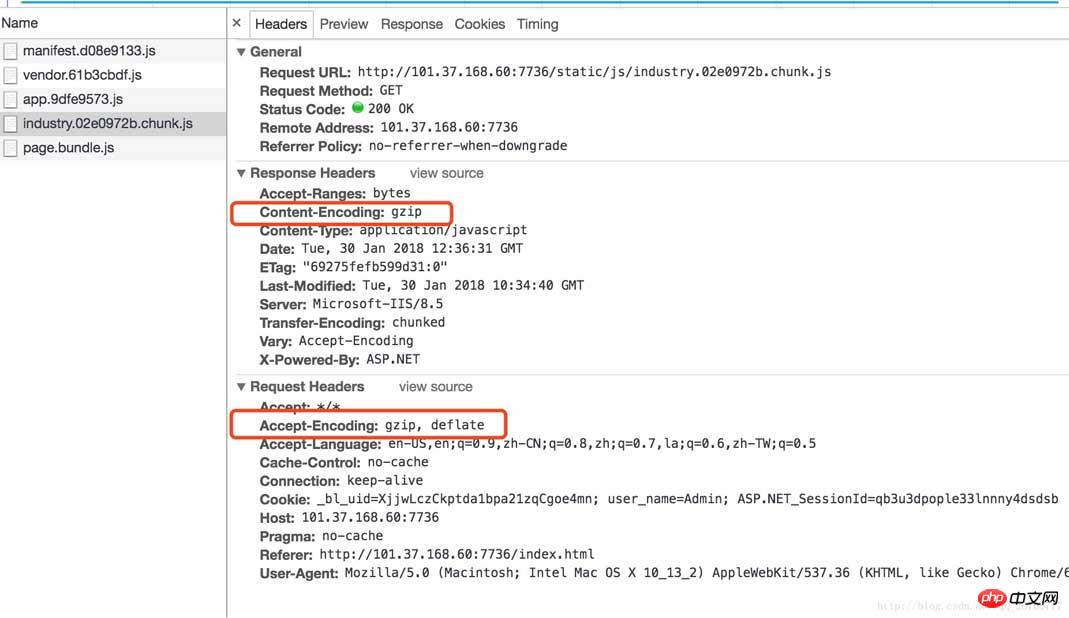本文主要和大家介绍了webpack打包之后的文件过大的解决方法,小编觉得挺不错的,现在分享给大家,也给大家做个参考。一起跟随小编过来看看吧,希望能帮助到大家。
以前一直使用 create-react-app 这个脚手架进行 react 开发,后面因为一些自定义的配置,转而使用 webpack 搭建一套自己的脚手架。但是在使用 webpack 打包之后发现,纳尼?怎么文件这么大??? 于是研究了一下如何处理 webpack 打包之后文件太大的情况,简单记录下来。
首先配置全局变量
首先,通过指定环境,告诉 webpack 我们当前处于 production 环境中,要按照 production 的方式去打包。
//指定环境,将process.env.NODE_ENV环境与library关联
new Webpack.DefinePlugin({
'process.env.NODE_ENV': JSON.stringify('production'),
}),优化 devtool 中的 source-map .
dev-tool 提供了很多种选项,用来增强我们 debug 的能力,我们熟知的有: source-map , inline-source-map , cheap-source-map 等等。详细的用法可以参考Devtool官方文档,Devtool配置对比 , webpack sourcemap 选项多种模式的一些解释 , https://webpack.github.io/docs/configuration.html#devtool 如果你的文件在打包之后突然变成好几M,那么不用想,肯定是因为 source-map 的原因。 source-map 在开发阶段确实很好用,调试起来很方便,但是在生产环境下就没必要部署了。 建议在 prod 环境下关闭 source-map 。
剥离css文件,单独打包
安装 webpack 插件 extract-text-webpack-plugin 。 npm install extract-text-webpack-plugin --save-dev 。 使用方法:
plugins:[ new ExtractTextPlugin('static/css/styles.[contenthash].css'), ]
这里使用了 contenthash , webpack 会根据内容去生成 hash 值。
使用 UglifyJSPlugin 压缩。
通过 UglifyJSPlugin 可以压缩我们的 *.js 文件。 安装方法: npm install uglifyjs-webpack-plugin --save-dev 。 用法: UglifyJSPlugin详细用法
const UglifyJsPlugin = require('uglifyjs-webpack-plugin')
module.exports = {
plugins: [
new UglifyJSPlugin({
parallel: 4,
uglifyOptions: {
output: {
comments: false,
beautify: false,
},
compress: {
warnings: false
},
},
cache: true,
}),
]
}提取公共依赖
使用 CommonsChunkPlugin 插件,将多个 js 文件进行提取,建立一个独立的文件。这个文件包含一些共用模块,浏这样览器只在刚开始的时候加载一次,便缓存起来供后续使用。而不用每次访问一个新界面时,再去加载一个更大的文件。
entry:{
app:'./entry',
vendor:['react','other-lib'],
},
plugins:[
new Webpack.optimize.CommonsChunkPlugin({
name: 'vendor',
}),
]开启gzip压缩
我们使用 compression-webpack-plugin 插件进行压缩。 安装: npm install compression-webpack-plugin --save-dev 。 compression-webpack-plugin 详细用法 使用:
const CompressionPlugin = require("compression-webpack-plugin");
plugins:[
new CompressionPlugin({
asset: '[path].gz[query]', //目标资源名称。[file] 会被替换成原资源。[path] 会被替换成原资源路径,[query] 替换成原查询字符串
algorithm: 'gzip',//算法
test: new RegExp(
'\\.(js|css)$' //压缩 js 与 css
),
threshold: 10240,//只处理比这个值大的资源。按字节计算
minRatio: 0.8//只有压缩率比这个值小的资源才会被处理
})
]压缩结果:


开启html压缩,自动添加上面生成的静态资源
添加插件 html-webpack-plugin
安装: npm install html-webpack-plugin --save-dev 用法:
plugins:[
new HtmlWebpackPlugin({
title: '',
template: __dirname + '/../public/index.html',
minify: {
removeComments: true,
collapseWhitespace: true,
removeRedundantAttributes: true,
useShortDoctype: true,
removeEmptyAttributes: true,
removeStyleLinkTypeAttributes: true,
keepClosingSlash: true,
minifyJS: true,
minifyCSS: true,
minifyURLs: true,
},
chunksSortMode:'dependency'
}),
]相关推荐:
vue-cli快速构建vue应用并实现webpack打包详解
以上是webpack打包之后的文件过大如何解决的详细内容。更多信息请关注PHP中文网其他相关文章!
 JavaScript的角色:使网络交互和动态Apr 24, 2025 am 12:12 AM
JavaScript的角色:使网络交互和动态Apr 24, 2025 am 12:12 AMJavaScript是现代网站的核心,因为它增强了网页的交互性和动态性。1)它允许在不刷新页面的情况下改变内容,2)通过DOMAPI操作网页,3)支持复杂的交互效果如动画和拖放,4)优化性能和最佳实践提高用户体验。
 C和JavaScript:连接解释Apr 23, 2025 am 12:07 AM
C和JavaScript:连接解释Apr 23, 2025 am 12:07 AMC 和JavaScript通过WebAssembly实现互操作性。1)C 代码编译成WebAssembly模块,引入到JavaScript环境中,增强计算能力。2)在游戏开发中,C 处理物理引擎和图形渲染,JavaScript负责游戏逻辑和用户界面。
 从网站到应用程序:JavaScript的不同应用Apr 22, 2025 am 12:02 AM
从网站到应用程序:JavaScript的不同应用Apr 22, 2025 am 12:02 AMJavaScript在网站、移动应用、桌面应用和服务器端编程中均有广泛应用。1)在网站开发中,JavaScript与HTML、CSS一起操作DOM,实现动态效果,并支持如jQuery、React等框架。2)通过ReactNative和Ionic,JavaScript用于开发跨平台移动应用。3)Electron框架使JavaScript能构建桌面应用。4)Node.js让JavaScript在服务器端运行,支持高并发请求。
 Python vs. JavaScript:比较用例和应用程序Apr 21, 2025 am 12:01 AM
Python vs. JavaScript:比较用例和应用程序Apr 21, 2025 am 12:01 AMPython更适合数据科学和自动化,JavaScript更适合前端和全栈开发。1.Python在数据科学和机器学习中表现出色,使用NumPy、Pandas等库进行数据处理和建模。2.Python在自动化和脚本编写方面简洁高效。3.JavaScript在前端开发中不可或缺,用于构建动态网页和单页面应用。4.JavaScript通过Node.js在后端开发中发挥作用,支持全栈开发。
 C/C在JavaScript口译员和编译器中的作用Apr 20, 2025 am 12:01 AM
C/C在JavaScript口译员和编译器中的作用Apr 20, 2025 am 12:01 AMC和C 在JavaScript引擎中扮演了至关重要的角色,主要用于实现解释器和JIT编译器。 1)C 用于解析JavaScript源码并生成抽象语法树。 2)C 负责生成和执行字节码。 3)C 实现JIT编译器,在运行时优化和编译热点代码,显着提高JavaScript的执行效率。
 JavaScript在行动中:现实世界中的示例和项目Apr 19, 2025 am 12:13 AM
JavaScript在行动中:现实世界中的示例和项目Apr 19, 2025 am 12:13 AMJavaScript在现实世界中的应用包括前端和后端开发。1)通过构建TODO列表应用展示前端应用,涉及DOM操作和事件处理。2)通过Node.js和Express构建RESTfulAPI展示后端应用。
 JavaScript和Web:核心功能和用例Apr 18, 2025 am 12:19 AM
JavaScript和Web:核心功能和用例Apr 18, 2025 am 12:19 AMJavaScript在Web开发中的主要用途包括客户端交互、表单验证和异步通信。1)通过DOM操作实现动态内容更新和用户交互;2)在用户提交数据前进行客户端验证,提高用户体验;3)通过AJAX技术实现与服务器的无刷新通信。
 了解JavaScript引擎:实施详细信息Apr 17, 2025 am 12:05 AM
了解JavaScript引擎:实施详细信息Apr 17, 2025 am 12:05 AM理解JavaScript引擎内部工作原理对开发者重要,因为它能帮助编写更高效的代码并理解性能瓶颈和优化策略。1)引擎的工作流程包括解析、编译和执行三个阶段;2)执行过程中,引擎会进行动态优化,如内联缓存和隐藏类;3)最佳实践包括避免全局变量、优化循环、使用const和let,以及避免过度使用闭包。


热AI工具

Undresser.AI Undress
人工智能驱动的应用程序,用于创建逼真的裸体照片

AI Clothes Remover
用于从照片中去除衣服的在线人工智能工具。

Undress AI Tool
免费脱衣服图片

Clothoff.io
AI脱衣机

Video Face Swap
使用我们完全免费的人工智能换脸工具轻松在任何视频中换脸!

热门文章

热工具

Dreamweaver CS6
视觉化网页开发工具

螳螂BT
Mantis是一个易于部署的基于Web的缺陷跟踪工具,用于帮助产品缺陷跟踪。它需要PHP、MySQL和一个Web服务器。请查看我们的演示和托管服务。

SublimeText3 Mac版
神级代码编辑软件(SublimeText3)

VSCode Windows 64位 下载
微软推出的免费、功能强大的一款IDE编辑器

SublimeText3汉化版
中文版,非常好用





